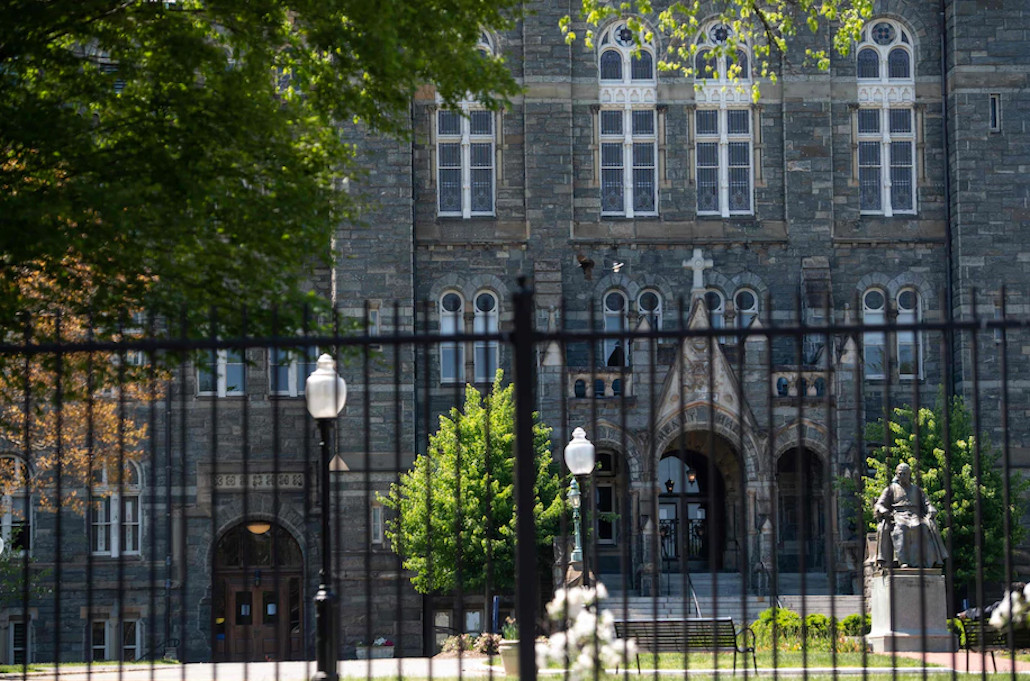D.C. should partner with universities to provide shelter

D.C. should partner with universities to provide shelter

By Tamar Hoffman and Jack Hsia
May 19, 2020 at 2:45 p.m. EDT
Tamar Hoffman and Jack Hsia are law students at Georgetown University Law Center.
The tragedy of loss is amplified by avoidability. While student dorms remain empty, the lives of people experiencing homelessness are at stake because they are unable to follow shelter-in-place and social distancing guidelines intended to slow the spread of the novel coronavirus. More than five hundred individuals who are experiencing homelessness in the District have been exposed to the virus, and 15 have died.
The District has one of the highest rates of homelessness in the country. People of color, people living in poverty, women with children, veterans, members of the LGBTQ+ community, people with disabilities and people experiencing domestic violence (which has increased during this crisis) are most at risk for becoming homeless and are in especially severe danger of contracting the coronavirus for this reason.
The D.C. Department of Human Services is struggling to prevent infections in people experiencing homelessness in the city. It has contracted with hotels to provide additional spaces and has added beds in shelters. However, these measures are inadequate. There are not enough hotel facilities that are contracting with the city, and people are being rushed out of hotel self-isolation spaces as a result. Adding beds in cramped shelter spaces makes social distancing impossible. Moreover, these emergency measures come at a great cost to the city. The city is paying approximately $180 per night for each hotel room, some in hotels that are known to be unsafe and unsanitary, while facing a $700 million budget shortfall.
This injustice is especially outrageous given the wealth of resources held by private universities in the District. D.C. could partner with private universities to resolve its dearth of shelter resources at a reasonable cost. For example, Georgetown University, the institution at which we are law students, owns more than 100 acres of land in the District and holds more than 1,600 residential rooms (and even more beds), including full apartments with kitchens (unlike hotel facilities), on its main and Law Center campuses. There are full buildings on the main campus walking distance from hospitals that are empty and have been since March. Only about 200 undergraduate students remain on its main campus, which usually houses more than 5,700. The Law Center’s residential space — all full apartments — is currently two-thirds vacant and will likely continue to empty in the coming weeks. The Law Center is only blocks from Community for Creative Non-Violence and Central Union Mission shelters, and therefore has the unique capacity to respond to the current homelessness crisis response without separating people from their communities and social services. Georgetown University has more than enough vacant space to house every unsheltered person in the District, according to the latest point-in-time study results.
Georgetown University, as with other institutions in the area, has suffered financial losses to the tune of $50 million because of the coronavirus crisis. However, these economic challenges do not excuse private universities such as Georgetown, which has an endowment of $1.8 billion, from providing resources already in their possession to the city. Rather, the financial crisis provides universities with an opportunity to build new partnerships to maintain financial viability. For example, universities could partner with the District to provide necessary residential spaces at a subsidized cost. The university is exempt from paying D.C. property tax and has recently joined DC2021, a coalition of some of D.C.’s largest businesses and developers lobbying the city for additional tax relief. As part of receiving tax relief, Georgetown could enter a partnership with the city to assist with shelter space. This would alleviate the university’s financial pressure associated with lost student tenant dollars while allowing the city to provide needed housing without buying $180-per-night hotel rooms for 7,000 people. Universities benefit financially and culturally from the D.C. community and should share their wealth during this crisis.
Universities and colleges around the country, including University of Southern Maine, Suffolk University and Hampshire College, have already taken important steps to provide housing to members of their communities in need during this crisis. Georgetown University, along with other city institutions, must not only follow suit but also lead in this growing movement to encourage other schools to do the same. Fighting the spread of the coronavirus requires rejecting the stigmatization of homelessness and acting in solidarity with our neighbors.
As members of the Georgetown University community, we believe our school must take affirmative and proactive steps to contribute to any lifesaving measures. The D.C. Department of Human Services is actively searching for outside resources and has expressed interest in using empty residential spaces to meet the unprecedented need for extra housing. Now is the time to strengthen partnerships between the District and its private universities.
